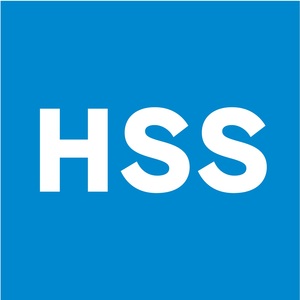NEW YORK, June 15, 2016 /PRNewswire/ -- Low health literacy is associated with poor health outcomes and is most likely to affect patients with low socioeconomic status and public health insurance. With limited internet access no longer a barrier, a new digital divide exists where patients of varying socioeconomic levels use different search terms when looking up medical information online.
"Patient education is vitally important for a variety of reasons," said Dr. Aaron Daluiski, hand and upper extremity surgeon at Hospital for Special Surgery (HSS). "An informed patient asks the right questions and is more likely to follow through on self-care after they leave the physician office."
A new study from HSS set out to determine if it's possible to effectively drive patients to patient information websites through passive means, regardless of their socioeconomic status. The study took an underutilized resource, the patient waiting room, and put up identical posters in one room that only treats privately insured and another room that only treats publically insured (includes Medicaid and non-paying patients).
A higher percentage of public patients accessed the website shown on the poster in the waiting room versus private patients (7.7 percent and 3.2 percent, respectively). 89 percent of all patients who accessed used a computer as opposed to a smartphone, suggesting a delayed action.
While patients with public insurance are at higher risk for obtaining low quality information, there is a big opportunity for physicians to provide them with verified online sources while in their own offices as they are more likely to access the sites.
"Using posters in a waiting room to drive patients to a website may not be the most effective method as the wall-to-web link proved to be a bit of a stretch," said Dr. Daluiski, the lead investigator. "However, this study revealed that publically insured patients are seeking online medical information and are open to physician direction, which will ultimately lead them to higher health literacy and stronger health outcomes."
About Hospital for Special Surgery
Hospital for Special Surgery (HSS) is the world's largest academic medical center focused on musculoskeletal health. HSS is nationally ranked No. 1 in orthopedics, No. 3 in rheumatology and No. 7 in geriatrics by U.S. News & World Report (2015-2016), and is the first hospital in New York State to receive Magnet Recognition for Excellence in Nursing Service from the American Nurses Credentialing Center four consecutive times. HSS has one of the lowest infection rates in the country. HSS is an affiliate of Weill Cornell Medical College and as such all Hospital for Special Surgery medical staff are faculty of Weill Cornell. The hospital's research division is internationally recognized as a leader in the investigation of musculoskeletal and autoimmune diseases. Hospital for Special Surgery is located in New York City and online at www.hss.edu.
Logo - http://photos.prnewswire.com/prnh/20150205/173659LOGO
SOURCE Hospital for Special Surgery
Related Links
WANT YOUR COMPANY'S NEWS FEATURED ON PRNEWSWIRE.COM?
Newsrooms &
Influencers
Digital Media
Outlets
Journalists
Opted In





Share this article